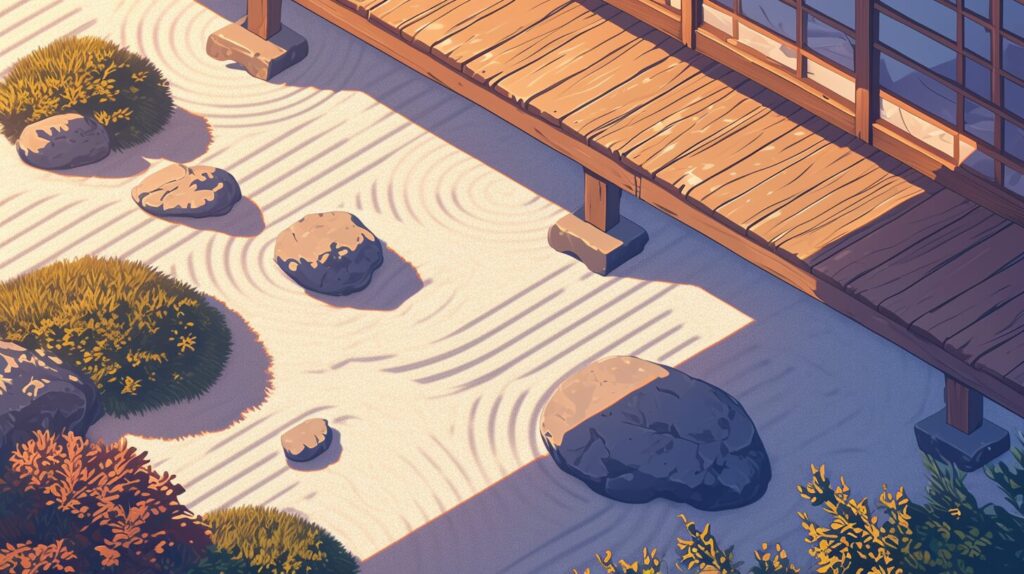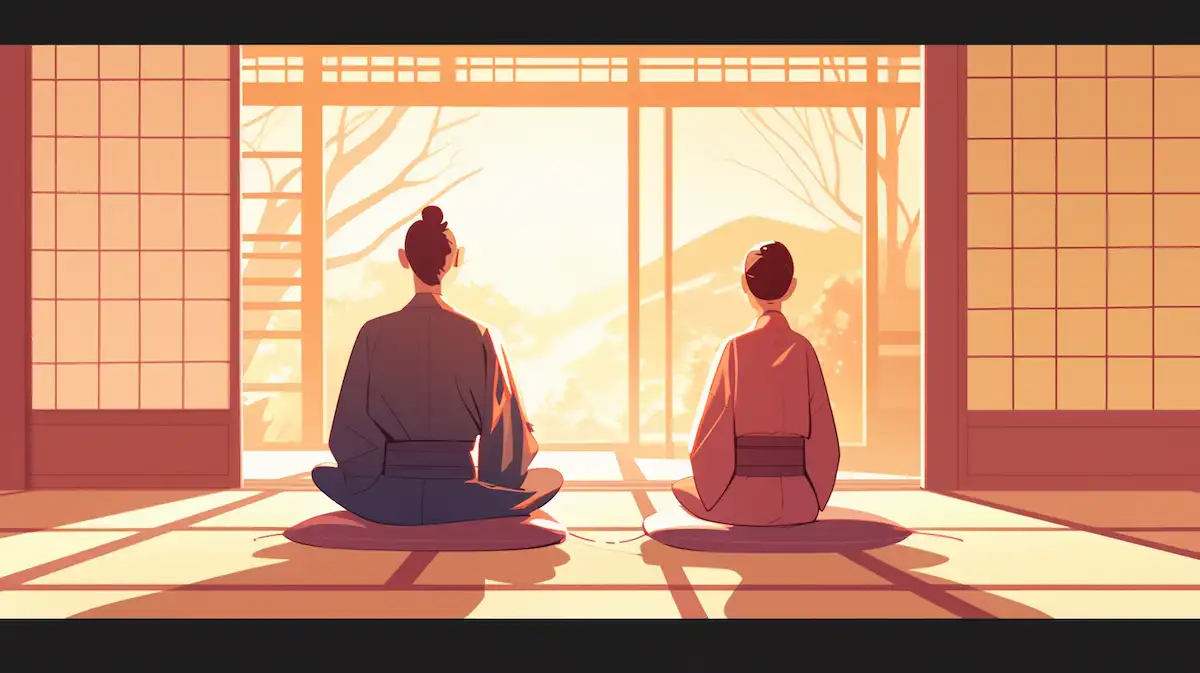禅を英語で説明・紹介するための基本情報と、英会話に役立つ表現をシンプルでわかりやすい英語で紹介します。
英会話ダイアローグ・概要・10の質問を通して、禅に関する英語表現を学びます。
英語
英会話ダイアローグを読む前に知っておくと良い前提知識と情報です。
- 禅の歴史的背景
- 禅はインド→中国→日本と伝わり、中国では「禅宗(チャン)」と呼ばれていた
- 鎌倉時代(12-13世紀)に栄西と道元によって日本に伝えられた
- 栄西は臨済宗を、道元は曹洞宗を開いた
- 禅の二大宗派
- 臨済宗:「公案」を用いた修行法を特徴とする
- 曹洞宗:「只管打坐」(ひたすら座ること)を中心とした修行法を重視する
- 禅の実践と概念
- 「公案」:論理では解決できない逆説的な問い(例:「片手の拍手の音は?」)
- 「座禅」:特定の姿勢で座り、呼吸に集中して心を静める瞑想法
- マインドフルネス:今この瞬間に集中する状態
- 禅と日本文化
- 茶道、書道、武道などの伝統芸術に深い影響を与えている
- 「枯山水」:石と砂を使った禅の精神を表現する日本庭園
- 俳句:自然の一瞬を切り取る詩形式
- 現代における禅
- ストレス軽減や精神的集中のための実践として世界中で人気がある
- 宗教的信仰に関係なく、誰でも実践できる
- スティーブ・ジョブズのような著名人も禅を実践していた
- 禅体験の場所
- 鎌倉の円覚寺:初心者向けの座禅体験を提供している有名寺院
- 東京周辺には座禅体験や週末リトリートを提供する寺院がある
2人が禅(Zen)について話しています。
禅の歴史や特徴、禅の目的、日本文化への影響、現代での人気などを話題にしています。
会話 / dialogue 音声付き

Hey Key, I’ve recently become interested in Zen. Have you tried it before?

Yeah, actually! Zen meditation is great. What got you interested in it?

I’ve heard it’s good for managing stress and clearing your mind. But I want to know more. Where did Zen actually come from?

Originally from India, from the meditation of Buddha himself. Then it traveled to China, where it developed into something called Chan Buddhism, before reaching Japan.

Interesting! When exactly did it arrive here in Japan?

In the Kamakura period, around the 12th and 13th centuries. Two monks, Eisai and Dogen, brought it over and founded the Rinzai and Soto schools.

Oh, I’ve heard those names. What’s the difference between Rinzai and Soto?

Rinzai uses special questions called “koan” to trigger deep insight, while Soto focuses mainly on quietly sitting meditation—Zazen.

Koan? What’s that exactly?

A koan is a puzzling question or short story without a clear answer. It’s meant to break normal thinking and open your intuition.

Sounds challenging but fascinating! What’s the main goal of practicing Zen meditation?

Mainly, Zen helps you achieve mindfulness, stay present in the moment, and develop clarity and calmness in your mind.

That’s exactly what I need. Have you noticed any personal benefits?

Definitely! I’ve become calmer, focused better at work, and appreciate everyday things more deeply.

Nice. I also read that Zen influenced Japanese arts and culture—is that true?

Absolutely. Traditional practices like tea ceremony, calligraphy, and martial arts all have Zen at their core.

I love Japanese gardens—are they also related to Zen?

Yes, especially rock gardens called “karesansui.” They use rocks and sand to create peaceful spaces for meditation and reflection.

Ah, that explains their peaceful vibe. And haiku poetry too, right?

Exactly! Haiku captures a simple moment from nature—reflecting Zen’s idea of living fully in the present.

It’s amazing how Zen is everywhere here. Is it also popular globally?

Yes, especially now. People worldwide use Zen meditation to reduce stress. Even famous leaders like Steve Jobs practiced Zen regularly.

Really? I had no idea. So Zen is less about religion and more about practical benefits, right?

Exactly! Zen doesn’t demand religious belief. It’s practical, anyone can do it, and it fits well with our busy lives today.

I like that. How can I start experiencing Zen here in Tokyo?

Many temples offer beginner meditation classes, or you could join a weekend Zen retreat to dive deeper.

That sounds perfect. Any specific temple you’d recommend?

You might enjoy Engaku-ji Temple in Kamakura—it’s beautiful, welcoming, and perfect for newcomers interested in Zen.

Awesome, I’ll definitely check it out. Thanks for all the information, Key! I’m excited to start my Zen journey.

No problem, Mack. I’m sure you’ll love it—it can truly transform how you see life.
概要 (「禅とは何か?」がわかる基本解説)音声付き
「禅(Zen)」について、理解を深めるための「英語での概要」です。
禅(Zen)

What is Zen?
Zen is a type of Buddhism that started in India with the meditation of the Buddha. It later moved to China and became “Chan Buddhism,” and then came to Japan in the 12th century. In Japan, Zen grew strong and became part of Japanese culture. Zen focuses on meditation, simplicity, and living in the present moment.
How Do People Practice Zen?
One of the main practices in Zen is Zazen, which means sitting meditation. You sit quietly, breathe deeply, and try to clear your mind. Some schools of Zen, like Rinzai, also use koan—strange questions or stories with no clear answer. These help people break free from normal thinking and use their intuition.
Why is Zen Special?
Zen helps people become calm and more focused. It teaches us to live simply and to enjoy small moments in life. Many people say Zen helps them deal with stress and feel peaceful. Zen doesn’t ask you to believe in a god, so anyone can try it, no matter their religion.
Zen in Japanese Culture
Zen has influenced many parts of Japanese culture. For example, the tea ceremony, calligraphy, rock gardens, haiku poetry, and martial arts all have Zen ideas inside them. Today, Zen is popular all around the world. People use it for mindfulness, self-care, and living a better life.
10の質問(禅の基本がわかるQ&A)音声付き
「禅(Zen)」について、理解を深めるための「英語での10の質問」です。
1: What is Zen?
Zen is a form of Buddhism that focuses on meditation, simplicity, and living in the present moment.
2: Where did Zen come from?
Zen started in India with the Buddha’s meditation, then moved to China and later came to Japan.
3: What is Zazen?
Zazen is sitting meditation. You sit quietly, breathe deeply, and try to calm your mind.
4: What is a koan?
A koan is a strange question or story with no clear answer. It is used in Zen to help people think in new ways.
5: Who brought Zen to Japan?
Two monks, Eisai and Dogen, brought Zen to Japan in the 12th and 13th centuries.
6: What are the two main Zen schools in Japan?
The two main Zen schools are Rinzai and Soto.
7: How does Zen help people?
Zen helps people feel calmer, reduce stress, and focus better on daily life.
8: Is Zen only for religious people?
No, anyone can try Zen. It does not require belief in a god or a religion.
9: What Japanese arts were influenced by Zen?
Zen influenced tea ceremony, calligraphy, rock gardens, haiku poetry, and martial arts.
10: Why is Zen popular today?
Zen is popular because it helps with mindfulness, mental health, and simple living in a busy world.

和訳付
会話 / dialogue

Hey Key, I’ve recently become interested in Zen. Have you tried it before?
ねえKey、最近、禅に興味が湧いてきたんだ。やったことある?

Yeah, actually! Zen meditation is great. What got you interested in it?
あるよ!禅の瞑想、すごくいいよ。なんで興味持ったの?

I’ve heard it’s good for managing stress and clearing your mind. But I want to know more. Where did Zen actually come from?
ストレスを減らしたり、頭をスッキリさせるのにいいって聞いてさ。でももっと知りたいんだ。禅って元々どこから来たの?

Originally from India, from the meditation of Buddha himself. Then it traveled to China, where it developed into something called Chan Buddhism, before reaching Japan.
元々はインドでブッダがやっていた瞑想から始まったんだ。それが中国に伝わって、「禅(Chan)」として発展し、その後、日本に伝わったんだよ。

Interesting! When exactly did it arrive here in Japan?
面白いね!日本には具体的にいつ伝わったの?

In the Kamakura period, around the 12th and 13th centuries. Two monks, Eisai and Dogen, brought it over and founded the Rinzai and Soto schools.
鎌倉時代の12〜13世紀ごろだね。栄西と道元というお坊さんが禅を日本に伝えて、臨済宗と曹洞宗ができたんだよ。

Oh, I’ve heard those names. What’s the difference between Rinzai and Soto?
ああ、その名前聞いたことあるよ。臨済宗と曹洞宗って、何が違うの?

Rinzai uses special questions called “koan” to trigger deep insight, while Soto focuses mainly on quietly sitting meditation—Zazen.
臨済宗は「公案」っていう特別な質問を使って悟りを深めようとする。一方で曹洞宗は静かに座る坐禅を中心にしてるんだよ。

Koan? What’s that exactly?
公案?それって具体的には何?

A koan is a puzzling question or short story without a clear answer. It’s meant to break normal thinking and open your intuition.
公案は、はっきりした答えがない難しい質問や短い話のこと。普通の考え方を超えて、直感を働かせるためのものなんだ。

Sounds challenging but fascinating! What’s the main goal of practicing Zen meditation?
難しそうだけど、面白いね。禅の瞑想をする主な目的って何?

Mainly, Zen helps you achieve mindfulness, stay present in the moment, and develop clarity and calmness in your mind.
主には、マインドフルになって、今に集中できるようになり、心がクリアで落ち着くようになるんだ。

That’s exactly what I need. Have you noticed any personal benefits?
それまさに今、自分が必要としてることだよ。個人的に効果を感じたことある?

Definitely! I’ve become calmer, focused better at work, and appreciate everyday things more deeply.
あるよ!心が穏やかになったし、仕事にも集中できるし、日常の小さなことにも深く感謝できるようになった。

Nice. I also read that Zen influenced Japanese arts and culture—is that true?
いいね。禅は日本の芸術や文化にも影響してるって読んだんだけど、それ本当?

Absolutely. Traditional practices like tea ceremony, calligraphy, and martial arts all have Zen at their core.
まさにそうだよ。茶道や書道、武道といった伝統文化には、禅の考えが根っこにあるんだ。

I love Japanese gardens—are they also related to Zen?
日本庭園が好きなんだけど、それも禅に関係あるのかな?

Yes, especially rock gardens called “karesansui.” They use rocks and sand to create peaceful spaces for meditation and reflection.
うん、特に「枯山水」っていう庭園がそうだね。石や砂を使って、静かな瞑想や内面を見つめる空間を作っているよ。

Ah, that explains their peaceful vibe. And haiku poetry too, right?
あぁ、だからあんなに静かな感じなんだ。あと、俳句もそうだよね?

Exactly! Haiku captures a simple moment from nature—reflecting Zen’s idea of living fully in the present.
そう!俳句は自然の中の一瞬をとらえてる。禅の「今をしっかり生きる」という考えを表してるんだよ。

It’s amazing how Zen is everywhere here. Is it also popular globally?
禅って日本の色々なところにあるんだね。世界的にも人気なの?

Yes, especially now. People worldwide use Zen meditation to reduce stress. Even famous leaders like Steve Jobs practiced Zen regularly.
うん、特に最近はね。世界中の人がストレス軽減のために禅の瞑想をしてる。スティーブ・ジョブズみたいな有名な人も禅をやってたんだよ。

Really? I had no idea. So Zen is less about religion and more about practical benefits, right?
本当?知らなかった。じゃあ禅は宗教というより、もっと実用的なメリットがあるってこと?

Exactly! Zen doesn’t demand religious belief. It’s practical, anyone can do it, and it fits well with our busy lives today.
そうなんだよ!禅は特定の宗教的な信念を求めないし、実用的で、誰でもできるし、忙しい現代の生活にも合ってるんだ。

I like that. How can I start experiencing Zen here in Tokyo?
いいね。東京で禅を体験するにはどうしたらいいかな?

Many temples offer beginner meditation classes, or you could join a weekend Zen retreat to dive deeper.
初心者向けの瞑想クラスをやっているお寺が多いよ。週末の禅のリトリートに参加して、深く学ぶのもいいと思う。

That sounds perfect. Any specific temple you’d recommend?
それ最高だね!具体的におすすめのお寺ってある?

You might enjoy Engaku-ji Temple in Kamakura—it’s beautiful, welcoming, and perfect for newcomers interested in Zen.
鎌倉にある円覚寺がいいかもね。すごく綺麗だし、初めて禅を学ぶ人にぴったりだよ。

Awesome, I’ll definitely check it out. Thanks for all the information, Key! I’m excited to start my Zen journey.
最高、絶対行ってみるよ。色々教えてくれてありがとう、Key!禅の旅が楽しみになってきた。

No problem, Mack. I’m sure you’ll love it—it can truly transform how you see life.
どういたしまして、Mack。きっと気に入るよ。人生の見方が本当に変わると思う。
概要(「禅とは何か?」がわかる基本解説)
禅(Zen)

What is Zen?
Zen is a type of Buddhism that started in India with the meditation of the Buddha. It later moved to China and became “Chan Buddhism,” and then came to Japan in the 12th century. In Japan, Zen grew strong and became part of Japanese culture. Zen focuses on meditation, simplicity, and living in the present moment.
禅は仏教の一種で、インドでブッダ(お釈迦様)の瞑想から始まりました。その後、中国に渡って「禅宗(Chan Buddhism)」となり、12世紀ごろに日本に伝わりました。日本では禅が大きく広まり、日本文化の一部となりました。禅は、瞑想・シンプルな生き方・「今この瞬間」を生きることに重点を置いています。
How Do People Practice Zen?
One of the main practices in Zen is Zazen, which means sitting meditation. You sit quietly, breathe deeply, and try to clear your mind. Some schools of Zen, like Rinzai, also use koan—strange questions or stories with no clear answer. These help people break free from normal thinking and use their intuition.
禅の主な修行のひとつが「坐禅」です。これは座って行う瞑想のことで、静かに座り、深く呼吸し、心を落ち着かせて無心を目指します。臨済宗のような禅の流派では、「公案」という答えのない不思議な質問や短い話も使います。これにより、普通の考え方から離れ、直感を使うようになるのです。
Why is Zen Special?
Zen helps people become calm and more focused. It teaches us to live simply and to enjoy small moments in life. Many people say Zen helps them deal with stress and feel peaceful. Zen doesn’t ask you to believe in a god, so anyone can try it, no matter their religion.
禅は心を落ち着け、集中力を高めるのに役立ちます。シンプルな生活を送り、日常の小さな瞬間を大切にすることを教えてくれます。多くの人が、禅によってストレスを減らし、心が穏やかになると感じています。禅は神様を信じる必要がないため、宗教に関係なく誰でも実践できます。
Zen in Japanese Culture
Zen has influenced many parts of Japanese culture. For example, the tea ceremony, calligraphy, rock gardens, haiku poetry, and martial arts all have Zen ideas inside them. Today, Zen is popular all around the world. People use it for mindfulness, self-care, and living a better life.
禅は日本文化のさまざまな面に影響を与えてきました。例えば、茶道、書道、枯山水(石庭)、俳句、武道などには、禅の考え方が息づいています。現在では、禅は世界中で人気があり、多くの人がマインドフルネスや自己ケア、より良い生き方のために禅を取り入れています。
10の質問(禅の基本がわかるQ&A)
1: What is Zen?
禅とは何ですか?
Zen is a form of Buddhism that focuses on meditation, simplicity, and living in the present moment.
禅は、瞑想、シンプルな生き方、「今この瞬間」を生きることに焦点を当てた仏教の一形態です。
2: Where did Zen come from?
禅はどこから来ましたか?
Zen started in India with the Buddha’s meditation, then moved to China and later came to Japan.
禅は、ブッダの瞑想に始まり、インドから中国へ渡り、その後日本へ伝わりました。
3: What is Zazen?
坐禅とは何ですか?
Zazen is sitting meditation. You sit quietly, breathe deeply, and try to calm your mind.
坐禅は座って行う瞑想です。静かに座り、深く呼吸し、心を落ち着けようとします。
4: What is a koan?
公案とは何ですか?
A koan is a strange question or story with no clear answer. It is used in Zen to help people think in new ways.
公案とは、はっきりとした答えのない不思議な質問や短い話で、人々が新しい考え方をするために使われます。
5: Who brought Zen to Japan?
誰が禅を日本に伝えましたか?
Two monks, Eisai and Dogen, brought Zen to Japan in the 12th and 13th centuries.
栄西と道元という二人の僧侶が、12~13世紀に禅を日本に伝えました。
6: What are the two main Zen schools in Japan?
日本にある二つの主要な禅宗の宗派は何ですか?
The two main Zen schools are Rinzai and Soto.
日本の二つの主要な禅宗の宗派は、臨済宗と曹洞宗です。
7: How does Zen help people?
禅は人々にどのように役立ちますか?
Zen helps people feel calmer, reduce stress, and focus better on daily life.
禅は、人々の心を落ち着かせ、ストレスを減らし、日常生活により集中できるようにします。
8: Is Zen only for religious people?
禅は宗教を信じる人だけのものですか?
No, anyone can try Zen. It does not require belief in a god or a religion.
いいえ、誰でも禅を実践できます。神や宗教を信じる必要はありません。
9: What Japanese arts were influenced by Zen?
禅の影響を受けた日本の芸術には何がありますか?
Zen influenced tea ceremony, calligraphy, rock gardens, haiku poetry, and martial arts.
禅は、茶道、書道、枯山水(石庭)、俳句、武道などの日本文化に影響を与えました。
10: Why is Zen popular today?
なぜ禅は現代でも人気があるのですか?
Zen is popular because it helps with mindfulness, mental health, and simple living in a busy world.
禅は、忙しい現代社会の中でマインドフルネスや心の健康、シンプルな生活に役立つため人気があります。

words & phrases
英会話ダイアローグと関連情報に出てきた単語・フレーズです(例文は各3つ)。

trigger : 動詞・名詞
意味: to cause something to start or happen suddenly / 何かが急に起こる・始まるきっかけを与えること(動詞)、引き金・きっかけ(名詞)
(禅の公案が深い洞察を引き出す「きっかけ」となる)
例文:
- The teacher’s question triggered a deep discussion.
「先生の質問が深い議論を引き起こしました。」 - Sudden noise can trigger anxiety in some people.
「突然の音は人によっては不安の引き金になります。」 - His comment was the trigger for their argument.
「彼の一言が口論のきっかけになった。」
meditation : 名詞
意味: the practice of focusing the mind for relaxation or spiritual growth / 心を静めたり精神を鍛えたりするための瞑想
(禅における中心的な修行である坐禅を表す)
例文:
- He practices meditation every morning to relax.
「彼は毎朝リラックスのために瞑想をしています。」 - Meditation can help reduce stress and improve focus.
「瞑想はストレスを減らし、集中力を高める助けになります。」 - Zen meditation is known as Zazen in Japanese.
「禅の瞑想は日本語で『坐禅』として知られています。」
puzzling : 形容詞
意味: confusing or difficult to understand / 理解しにくい、混乱させるような
(公案が簡単に答えられない「不思議な」問いであることを表す)
例文:
- The math problem was puzzling to many students.
「その数学の問題は多くの生徒にとって難解でした。」 - I found his message a bit puzzling.
「彼のメッセージはちょっと分かりにくかったです。」 - Koan is a kind of puzzling question used in Zen.
「公案は禅で使われる一種の不思議な問いです。」
intuition : 名詞
意味: the ability to understand something without using logic / 論理を使わずに物事を直感的に理解する力
(禅では直感による理解が重要であり、公案を通じてそれを引き出す)
例文:
- She had a strong intuition that something was wrong.
「彼女は何かおかしいと強く直感しました。」 - In Zen, people try to use their intuition, not logic.
「禅では、人々は論理ではなく直感を使おうとします。」 - His intuition helped him make the right decision.
「彼の直感が正しい判断を助けました。」
reflection : 名詞
意味: serious thought or careful consideration; also, an image seen in a mirror / 深い考え・内省。または鏡などに映る像
(禅庭(枯山水)などで心を静かにし、自分と向き合う「内省」の意味)
例文:
- After some quiet reflection, she made her choice.
「静かに考えた後、彼女は決断しました。」 - Zen gardens are good places for peaceful reflection.
「禅庭は静かに内省するのに適した場所です。」 - I saw my reflection in the water.
「水面に自分の姿が映っていました。」
